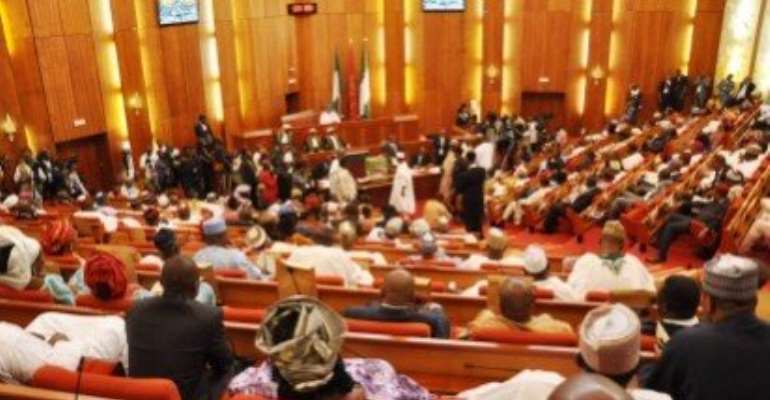Senate summons Finance Minister, CBN Governor over state of economy …as Naira depreciates further against dollar

The Senate on Wednesday expressed serious concern over the poor state of the nation's economy.
The lawmakers consequently summoned the Minister of Finance, Mrs. Kemi Adeosun, and the Governor of the Central Bank of Nigeria (CBN), Mr. Godwin Emefiele, to brief it on the monetary/fiscal policies being adopted to salvage the worsening economic situation.
The resolution followed a motion by the Chairman, Senate Committee on Gas, Senator Bassey Akpan, after reviewing the economic situation recently released by the National Bureau of Statistics.
The report, he said, showed that the economy had relapsed into a recession with a decline of 0.3 per cent year-on-year real terms.
Bassey stated, 'From the report, unemployment rate rose to 12.1 per cent in Q1, 2016 from 10.4 per cent in Q4, 2015.
'Underemployment also increased to 19.1 per cent from 18.7 per cent in the same period while the rate of inflation rose from 9.6 per cent in January, 2016 to 13.8 per cent in April, 2016 with the attendant increase in prices of basic food commodities and services in the country.
'The declining Gross Domestic Product and unemployment besides the current high inflation rate clearly shows that the economic policies are not achieving desired impact and require an urgent review to avoid further plunge in our economy.'
The senator argued that the current economic situation was the first major crisis of the Nigerian economy since 2004, which, he noted, the CBN classified as 12-year low while the World Bank called it 21-year low.
He also recalled how the CBN had, in March, 2016, deployed a contracting monetary policy, which, he said, increased the benchmark for interest rate from 11 per cent to 12 per cent and also raised the cash reserve ratio from 20 per cent to 22.5 per cent.
He queried the rationale behind contracting monetary policy instead of expanding it to boost economic activities at the current precarious times.
Akpan said if the persistent complacent state of the Nigerian economy continued unchecked, it would graduate into a full blown economic recession at the end of June 2016 in accordance with the CBN alert.
He added that non-availability of forex to boost the importation of raw materials for Nigeria's domestic industries would only worsen the current unemployment and poverty rates in the country.
Akpan lamented the declining oil production in the Niger Delta from the projected 2.2 million barrels per day to 800,000 bpd as a result of vandalism of oil pipelines.
He added that the incapacity of the Federal Inland Revenue Service and the Nigeria Customs Service to meet their revenue targets as a result of cash crunch would further worsen the situation.
He noted that the naira had been completely devalued in accordance with the newly announced forex flexibility by the CBN while the exchange rate approved in the medium term and expenditure framework 2016-2018 remained N197 to $1.
Akpan stated that the fate of ordinary Nigerians on the street remained uncertain, noting that in view of the current economic recession, achieving key revenue projections in 2016 budget would remain an illusion.
He advocated the urgent need to strategise against budget deficit or poor implementation in the current fiscal year.
Senate President, Bukola Saraki, who presided over the session before he vacated his seat for his deputy, Senator Ike Ekweremadu, while on his way to the Code of Conduct Tribunal, did not allow his colleagues to debate the motion to avoid tension.
Senator Biodun Olujinmi (Ekiti South), who seconded the motion, believed that contrary to Akpan's submission that the current economic policies had not only been unfruitful, the President Muhammadu Buhari administration did not have feasible economic policy at all.
According to her, everything is wrong with the economy, which, she says has resulted in the belated devaluation of the naira.
Olujinmi said Adeosun and Emefiele must not just appear before the Senate but they must also come up with the Federal Government's economic blueprint.
She added, 'In seconding the motion, Mr. President, it is very clear that there is no visible economic policy in Nigeria; everything has gone down especially with the devaluation of the naira.
'The two people that have been invited, the minister of finance and the Governor of Central Bank of Nigeria to come and see us, they will come with an economic blueprint and ways of applying palliatives to this our economy.'
However, despite agitations from the floor by the senators to debate the motion, Saraki declined the demand, saying merely passing a resolution through a voice vote to summon the government officials was enough.
Thus, when the issue was eventually put to a voice vote, it was passed amid dissenting voices.
Meanwhile, the Naira on Wednesday weakened further against the dollar at the parallel market, barely 24 hours after the Central Bank of Nigeria (CBN) moved for the adoption of a flexible exchange rate.
The naira sold at N350, weakening further from its rate on Tuesday when it went for N347 to a dollar.
The Pounds Sterling and the Euro opened at N385 and N380 and closed at N390 and N385 respectively.
Traders at the market said that they were keenly watching out for the impact of the new foreign exchange policy of the apex bank at the market.
CBN, at the end of its Monetary Policy Committee (MPC) meeting on Tuesday, adopted a flexible exchange policy for the economy, a move financial experts said was long overdue.

